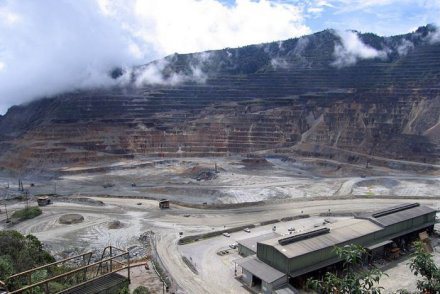
Source: ABC Australia
PNG's prime minister has been accused of 'grossly misrepresenting' a court decision over disputed funds from the Ok Tedi mine.
The PNG SDP and the PNG government are fighting over control of a trust which uses money from the Ok Tedi mine to fund development projects (Credit: Audience submitted)
The PNG Sustainable Development Program (PNG SDP) and the PNG government are involved in a bitter tussle for control of the $1.4 billion trust, which uses money from the Ok Tedi mine to fund development projects.
The mine was effectively nationalised a year ago, when the PNG government took control of the PNG SDP's share of the company.
In response, the PNG SDP launched legal action in Singapore, and the PNG government has filed a counter-claim with the Singapore Supreme Court.
PNG SDP chairman Sir Mekere Morauta called on prime minister Peter O'Neill to "correct the falsehoods" made in a recent media statement about the case, which appeared to celebrate a legal victory.
Last week, Mr O'Neill welcomed a ruling on the government's counter-claim, that he said prevented PNG SDP from drawing money from its $1.4 billion Long Term Fund to pay for operational expenses.
"This decision by the court in Singapore confirms our position," he said.
"The Long Term Fund is meant to be drawn down for the development of Western Province and its people; not to pay for the upkeep of a few individuals."
Ok Tedi mine
- BHP first began mining for gold in 1984.
- One of the world's largest copper deposits later found at the site.
- In the 1990s landowners sued over environmental damage from mining waste.
- As part of the settlement BHP placed its share in the hands PNG Sustainable Development Project
- Two-thirds of the money earned from Ok Tedi is paid into fund for use after mine closes.
- Remaining third goes to development projects across Papua New Guinea.
- In September 2013, the PNG government took over PNG SDP's majority share, giving it 100 per cent control.
- Government and landowners moved to extend mine's life until at least 2015
Sir Mekere said the government actually lost the case, and the restrictions on accessing funds were part of a temporary injunction put in place while the PNG government prepares an appeal.
"It is therefore puzzling to say the least that the PM 'welcomes' the Singapore court's ruling in this regard, when the state has lost its application before the judge and is [in] fact seeking to overturn the decision on appeal," he said.
The official judgement from the Singapore Supreme Court has not yet been posted on the Singapore Law Watch website.
PNG's attorney-general Ano Pala flew to Singapore to attend proceedings and raised the issue in parliament.
"The state did not 'lose' the application; neither did the court 'dismiss' the same," he said.
However, Mr Pala appeared to contradict himself in the next two paragraphs of his statement.
"The court did not grant an injunction to expressly restrain PNG SDP from disposing of its assets in its Long Term Fund at this juncture," he said.
"The state therefore will be taking steps to pursue an appeal in this regard."
Since the judgement, solicitors from both parties have submitted letters to the Singapore Supreme Court to clarify and defend their positions.
Dispute over funds
The PNG SDP was set up in 2002 as part of BHP's exit from the Ok Tedi mine, which caused extensive environmental damage to the Western Province.
BHP agreed to place its majority share of the mine in the hands of the Singapore-registered not-for-profit company PNG SDP, in return for impunity from future prosecution over the environmental damage.
Two-thirds of the money earned from Ok Tedi is paid into a Long Term Fund for use after mine closes, while a third goes to development projects across Papua New Guinea.
In September 2013, the PNG government passed legislation that took control of PNG SDP's 63 per cent share of Ok Tediand revoked BHP's impunity from prosecution.
The government already owned the remaining 37 per cent.
As well as the Singapore legal action - which seeks to block the government's removal of board members and its chairman - PNG SDP has lodged a case with the International Centre for Settlement of Investment Disputes in Washington DC.
- Elizabeth1's blog
- Log in to post comments
